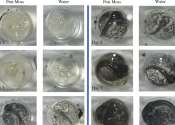In ecology, predation describes a biological interaction where a predator (an organism that is hunting) feeds on its prey (the organism that is attacked). Predators may or may not kill their prey prior to feeding on them, but the act of predation always results in the death of its prey and the eventual absorption of the prey's tissue through consumption. Other categories of consumption are herbivory (eating parts of plants) and detritivory, the consumption of dead organic material (detritus). All these consumption categories fall under the rubric of consumer-resource systems. It can often be difficult to separate our various types of feeding behaviors. For example, parasitic species prey on a host organism and then lay their eggs on it for their offspring to feed on it while it continues to live or on its decaying corpse after it has died. The key characteristic of predation however is the predator's direct impact on the prey population. On the other hand, detritivores simply eat dead organic material arising from the decay of dead individuals and have no direct impact on the "donor" organism(s).
Selective pressures imposed on one another often leads to an evolutionary arms race between prey and predator, resulting in various antipredator adaptations.
The unifying theme in all classifications of predation is the predator lowering the fitness of its prey, or put another way, it reduces its prey's chances of survival, reproduction, or both. Ways of classifying predation surveyed here include grouping by trophic level or diet, by specialization, and by the nature of the predator's interaction with prey.









